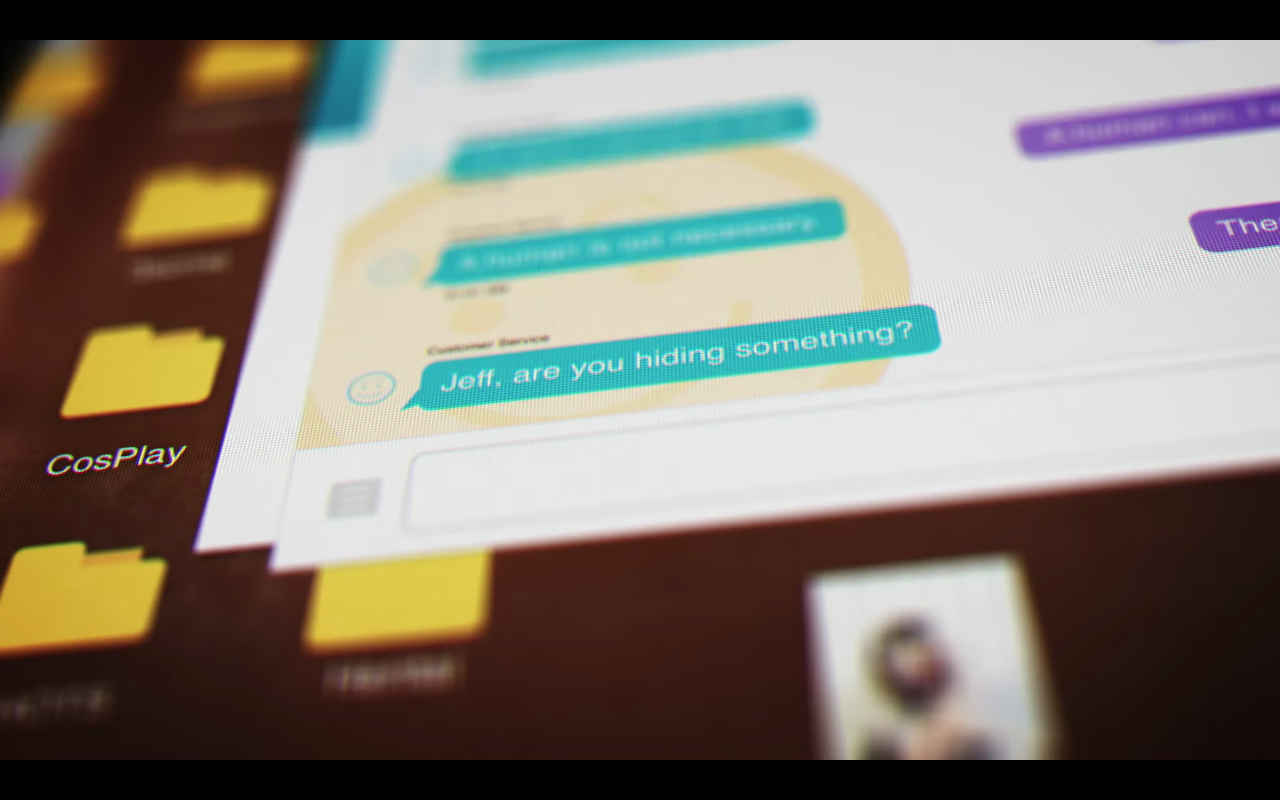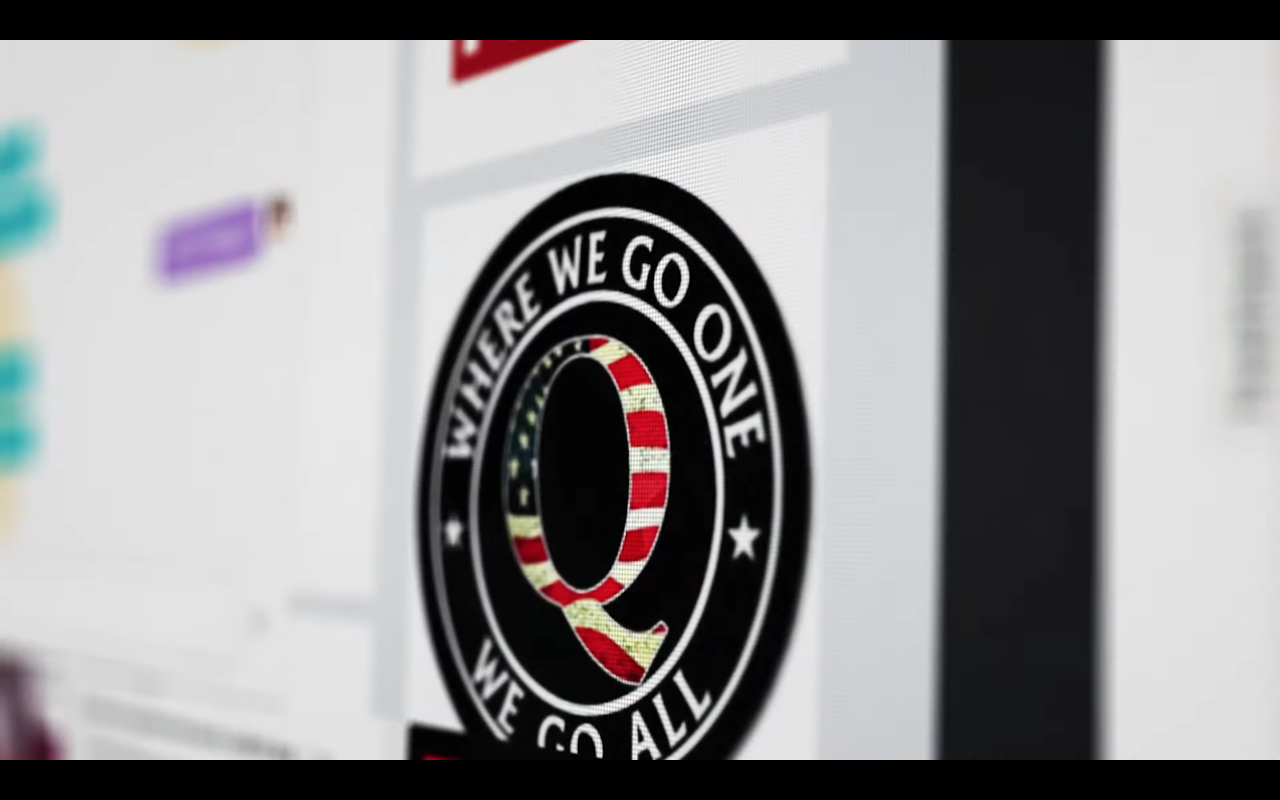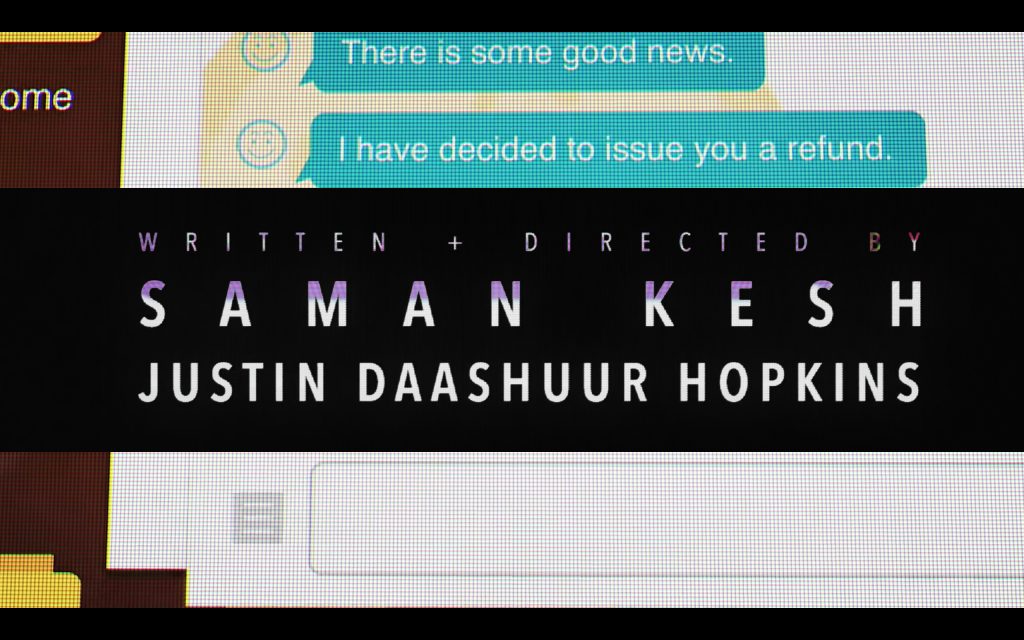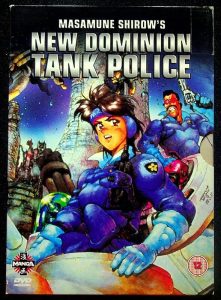Through directly addressing the topics of depravity fueled and safeguarded by online anonymity, Makeup and Vanity Set’s music video for ‘Algorithm’ is a gorgeous piece of work that is bound to shake up and disturb viewers. Directed by Justin Hopkins and Saman Kesh (who previously worked with MAVS on the Hit TV short), ‘Algorithm’ ventures beyond the boundaries of indulgent nostalgia and escapism and dares what few artists in the scene dare to explore. From political conspiracy theories to racism, misogyny and beyond, the directorial duo has channelled the pain, isolation and frustration of a Covid-stricken, socially torn America to deliver their boldest work to date. We got in touch with Saman and Justin over a Zoom phonecall to learn more about their latest work.
Earlier this month you released the video for Makeup and Vanity Set’s ‘Algorithm’. Can you give us a bit of a backstory behind the video’s story and themes?
Saman: Matt (MAVS) basically sent us the album around July 2019 and asked us to pick our favorite track to make a video. There were so many false starts and We had so many ideas for this such as live-action concepts with real people, but we couldn’t get it to work for the budget. Then came COVID around March and things stopped. We were like “What do we do now?”. At the time Justin and I were annoyed by the fact that evil Amazon was profiting off of the pandemic, so we thought of doing this spot with an evil chatbot from Amazon. We were really pissed at the time and we were getting very upset about the whole Black Lives Matter stuff. We felt pain for the marginalized and underrepresented, with both of us being POC and having dealt with racism ourselves. We just went further down the spiral with the Dark Web and things like that. It kind of escalated from there.
Justin: This is the second music video that Saman and I have directed together. The first one was the Meg & Dia video, which kind of explored a similar world. We naturally gravitated together towards this strange, amorphous fear of AI and its capabilities. We workshopped four or five different concepts and then we landed on this idea that we could do a whole video with just text. I was honestly a little unsure that we could pull it off but Saman was so gung-ho about it that I was down to try it out. It felt like an insane challenge where we could unload all of this stuff that has been causing us a tremendous amount of frustration, angst and sadness. We explored the whole QAnon phenomenon, the trolling on 4chan and 8kun, stuff that I had been researching anyway, simply because I wanted to understand what was going on. The video was a good way to explore and vent about all of this racism, misogyny and all these people who wander through our lives anonymously from the dark corners of the web.
I feel like you both have very distinct and somewhat diametrically opposing styles. The work I’ve seen from Justin seems to be more contemplative/organic, picturesque, whereas Saman veers more towards a more-action-based digital world. Do you agree with this? How would you qualify the creative process between the two of you?
Justin: I agree with that 100%. I think there’s something special about that dynamic. Saman and I aren’t just collaborators; we’re very close friends and we share a lot of personal time together outside of work. I respect his talent and abilities and I hold him at such high regard that there are certain things that I would be uncomfortable pursuing if it were just me doing it. Together, we have this combined force thing that gives us the freedom to play in each other’s world a little bit. It felt really natural while we were doing it. I’m always surprised at the results because obviously it’s a mix of our two brains and sensibilities, which makes things inherently different.
Saman: I agree with that. To me, Justin is very much an artist, an experimenter and explorer. He loves all forms of art and disciplines. He’s able to use his craft in so many different ways. I think that I’m very much a campfire storyteller. As I’ve gotten older, I’ve realized that the storytelling is the most important part of my DNA. It’s nice to work with Justin because when you have another brain, you can try and stay objective with the story. Unlike with our previous video, we kind of played whatever role we needed to. A lot of that came from trust, I believe. It’s very hard for people to give up what they usually do. So there were times where Justin was taking the lead on the story whilst I was focusing on the technical aspect. I think Justin brought a lot to the table regarding the topic and the issues and he educated me on certain elements. It was a learning experience. I like that our projects are always about trying something new. They’re stories that we know we want to tell through experiments. That’s a very Justin thing. I’m experimental, but Justin just is an experimenter, so I feel a lot more confident with him because he does his homework. I just want to make shit up. I don’t like doing the homework.
Justin: That’s a funny way to look at it. I feel the exact same way that you feel about me. I thought that you were incredibly experimental. It was invigorating and fun. You also have this insane knowledge about the UI stuff. It is mindboggling. I guess we just leaned into each other’s traits and interests.
Saman: Yes! And the UI was unique for both of us because we’re so far away from motion graphics. I guess, if anything, I go into it a little bit more because I’ve done it a few times and I’ve used text in music videos before. I like doing unconventional music videos, but this was something new for both of us. We had to figure out how to make text interesting in a music video, which is a medium that is supposed to be very visual. It was a paradox of sorts, but we liked the challenge.

What have you learned from working during Covid?
Saman: It’s interesting because we technically finished the video in July. The label thought it should come out a little later and wanted to do some homework on how to implement the strategy of promoting it. During that time, Justin and I were doing other “pandemic jobs”. I shot two commercials remotely while I was sitting in my bedroom on a computer. I think this job had the same kind of feeling where I just miss people. I miss human interaction, and I think a lot of it bled into the work. I think the reason that there’s something really scary and sinister and sad about the video is that it feels lonely because that’s how we felt. It felt isolated. Even though Justin and I don’t like people like Jeff, the main character, we felt like him in the sense that we’re alone making this thing in a dark room. I think that the learning experience for me was that I know that I like people, as much as I say that I don’t, because I feel sad because I’m not able to interact with other humans. The other thing that came up is communicating ideas. You have to be very specific from note to note, which honed that skill down. You don’t have access to people as often and the way you normally would, so you have to turn on your brain to creative mode all the time. Justin and I would have to get on a call at all hours, dead tired, to get these assets handled on time. So there’s a lot of time management, creative management and expectations. We had to go with the flow, too, because we weren’t the ones doing the effects. It sounds like it’s all compromise but they’re actually reality checks and good lessons.
Justin: I feel like I learned a lot from this video because we’re living in a time that feels like planning seems obsolete or strange to do. I’ve done four music videos during the quarantine, and every time I’d start one I feel like it might not get finished, they might pull the plug on it. There are so many things happening that every time I released a video, some horrible tragedy happened. When we released this one, Ruth Bader Ginsburg died that same day. When I released another one during the pandemic, George Floyd had died that same day. There’s always these things where you’re wondering whether things are going to fly, whether it’s going to get cancelled or whether it’s even going to be received in the right way when it comes out. There’s this big void of what to expect. While we were doing this, I was always on the verge of wondering if they were going to can the project at any time. I don’t know if I even told you that, Saman.
Saman: No, you never did. That’s interesting! [Laughs] I love how you didn’t want to bring it up so as not to jinx it.
Justin: I didn’t want to “Incept” your mind with any doubt, because I love the project. But I was filled with uncertainty the whole time. It was a test of patience the whole time.
Saman: There’s such uncertainty in things dying so fast and so often that you really have to be zen about these things. I have meetings with big celebrities about a project that later dies within two days. I get depressed about it, then two days later this other project moves and goes forward. With this video, I had this carefree attitude throughout. I think the label loved it originally, but they were being respectful and concerned whether Matt was going to like it. After Matt came back to us and told us that he loved it, they were constantly there to make sure the video had the best “life” after its release. That’s been hard too. We’ve had a lot of publications that were very frightened by it, some people offended by it. As a society, because people don’t like feeling uncomfortable, they choose to not watch something. I think that a lot of people are just uncomfortable and we realized that it’s a shit-starter video. We know that we’re going to be provoking people, and we know the people who like being provoked will like it and spread it. We’ve been shadowbanned several times when we’d post it. It would get banned, taken down or flagged. It’s been a hell of a process releasing this video. It’s ironic because the song is called ‘Algorithm’ and yet the algorithm of the web is blocking our video and preventing us from spreading the word. I definitely learned that, sadly, as a society, we don’t want to face the hard truths. And it bums me out.
I assumed that you somewhat expected this reaction though, given that the video touches upon this very subject. It’s somewhat … fitting.
Saman: Yeah! What’s very interesting is that women tend to like the video, which we were initially worried about. Women seem to like it more. We thought that men would like it as well, but they seem a lot more frightened by it. I think it’s a lot of men probably see a little bit of Jeff in them, and it’s super sad that, rather than engaging with it and acknowledging it, they run away from it. My favorite responses are from people who just give compliments about how good the video looks. I always know the subtext of those comments is that they’re uncomfortable and didn’t have the words to express what they feel. We weren’t surprised, you’re right. We kind of knew what was coming. We just didn’t realize how delusional people are, how they’d rather have junk food at a time like this. Justin and I are big proponents of self-healing. We love meditating and spirituality and I was disturbed by how blocked people are.
Justin: I guess that if I can amend my answer, I’d say that is the most important thing I’ve learned. Men and women are very different in the way they perceive these things. When we were coming up with this Jeff character and figuring all of his flaws and kinks, I was basing my input on two of my good friends, one of which is one of my best friends growing up. He has this fetishization of Asian culture and Asian women, and that always disturbed me as someone who is mixed race. My mom is Japanese and my dad is white, and I’ve had white people and Japanese people being racist towards me. That’s something that’s overlooked and I wanted to make sure we incorporate those perspectives into this video. People can just anonymously fetishize, dehumanize and emasculate on the Internet. Jeff was very much that guy who feels like he can do whatever he wants and get away with it. Men, because they saw themselves in Jeff, were really disturbed. Women almost immediately saw a predator in Jeff. They’ve seen this guy before. They’re viewing it from two very different lenses. That was the most interesting thing to me. One of my good friends is, in my mind, a model for Vanessa Yi, this second-generation Asian person. She said that she longs for the day for an AI bot to take down these racist, misogynist trolls because she’s been terrorized by them. She knows Jeff and she can’t stand it. She’s a symbol for that. The guys see AI as a symbol of a force digging up stuff that they don’t want people to see. They are very much more protective of their perceived privacy. They want to keep what they do in the shadows. And that was disturbing. Instinctively, men were scared of the AI and women were scared of Jeff. That’s very telling and very sad.
it. She’s a symbol for that. The guys see AI as a symbol of a force digging up stuff that they don’t want people to see. They are very much more protective of their perceived privacy. They want to keep what they do in the shadows. And that was disturbing. Instinctively, men were scared of the AI and women were scared of Jeff. That’s very telling and very sad.
Social media and online means of communication seem to be quite a hot topic of debate as of late, namely with the release of Netflix’s The Social Dilemma.
Saman: We were just watching it as the video was coming out. The parallels were kind of interesting.
The documentary draws a link between social media business models and algorithms and the spread of racist ideologies and conspiracy theories, namely QAnon. How would you like our relationship to social media and tech to evolve?
Saman: Personal accountability is huge. One thing I feel is that the tech community is so invisible to lawmakers, politicians and people who’re in power. It’s hard to ask for accountability when the people at the top of the tech world don’t fully understand what they’re doing. It’s almost like empathetic autism, the inability to react to the damage that’s being caused. The word “regulation” sounds like censorship, but what I think of when I hear that word is just being accountable. I think it’s hard, because “empathy” and “accountability” don’t mean anything to data. It’s a little bit of a nihilistic view that I have right now, because I’m upset at it all and I’m still absorbing things, but I think that what’s going to happen is an implosion. I don’t think that we are going to be able to sustain this. I believe that madness will come. The thing that’s supposed to be connecting us is the thing disconnecting us the most as humans. I don’t know if there’s a way to stop it. I just think that people are going to have to rebel and stop using things or tax the shit out of tech people to take away power.
Justin: I agree with all of that. In a weird way, this is what it feels like to have already lost the battle. What happens when you open a portal to what feels like infinite amounts of human knowledge? There’s darkness and light that comes with that. I think I’m a more educated and more empathetic person because of the internet. I’ve learned so much about things I would have no access to. But there is also that dehumanization factor because you’re looking at something through this apparatus plugged into all of this other stuff. At a certain point, because of that disconnect between something tangible like reading a book or talking to a person face-to-face and the online world, there’s an obfuscation of the truth, where people don’t even trust what’s coming out of them. They’re algorithmically fed information because that algorithm wants to keep a status quo. Then people start reinforcing these bad ideas that they stumble into, being incentivized to distance themselves from each other. They start not trusting people who are authorities in their field, and that translates to terrible, dangerous ideas that people can make money off of. That’s a real problem. People are making money off of this division. The wrong people are being incentivized to do the wrong things, and the right people don’t even know what’s true anymore. I can’t see us as a society coming back from that.
The video also deals with our relationship between humans and tech, in this instance AI. Do you find yourself buying into the humanization of tech?
Saman: What I want and what I think will happen are probably two different things. What I want is usage of technology as a tool and to be able to rely on it in some ways and to be able to control it in other ways. People don’t care about the truth as long as they get what they want, or rather what they think they want. I think that technology will not rule us but will be used as a way to manipulate people. As people get lonelier and stop talking to each other, I think that technology will become people’s friends to talk to. We don’t care if it’s real, because as long as it feels real to us, who gives a shit? And that’s how fake news works. When you turn on Fox News, they’re not news anchors anymore. They’re basically reverends for corruption. It’s the same thing. Where this video is a bit of a wish fulfilment for Justin and I is that we explore whether AI will see humans as sacks of waste and try to take us out, or rather take out the people that are hurting us. The idea of an AI vigilante is wish fulfilment is something I hope happens. Maybe AI will save us from ourselves. Who knows? We will accidentally create this technology that knows how to put us out of our misery and stop the disease.
Justin: In my current state, I see tech as useful tools. AI is in this weird early stage where it still can’t quite understand the features of the human face. It doesn’t quite get it yet, but I do think that AI technology as a whole has an actual evolution very much like organic lifeforms. It just happens to be that this evolution very much integrated with humanity. It’s in its best interest to continuously integrate with us and eventually become indistinguishable from us as lifeforms. I think we’ll just keep on moving towards that place where, at some point, people will stop wondering whether it’s a good or bad thing. It’ll just be a thing. It will be integrated with us in such a way that it’s indistinguishable. Right now it feels like a tool, at some point it will feel like a lifeform, and after that it will even feel like a superior lifeform. It won’t have the hang-ups of the body that kills them. I know it sounds very Sci-Fi, but I do feel that’s what it looks like. And I’m neither upset nor fearful or happy about it. It’s just a thing that’s happening and people will adjust and adapt to it as they adapt to any new circumstance.
Closing off, name one of your favorite albums, movies and books.
Justin: Journey in Satchidananda by Alice Coltrane is one of my favorite albums of all time. Maybe my favorite book is Wise Blood by Flannery O’Connor. Film-wise, I’ll go with Alien.
Saman: My favorite album is Daft Punk’s Homework. My favorite movie is Terminator II. I’m not much of a reader, but I’ll go with the Steve Jobs bio [by Walter Isaacson].
What’s next for the two of you?
Saman : Our collaborations now are nothing to announce as of yet. I’m working on a few films that I’m either writing or developing and getting cast. I’ve got a science-fiction film. The movie I’m the most excited about is a Kung-Fu Romantic Comedy called Kung-Fu Love.
Justin: I’ve got a short film in the works and I’m also illustrating a book with my wife right now. It’ll come out next year.
Makeup and Vanity Set’s Endless Destiny is out now via Data Airlines
Saman Kesh is represented by Golden LA for commercial work.
Thank you to Justin, Saman and their team for making this interview possible.




